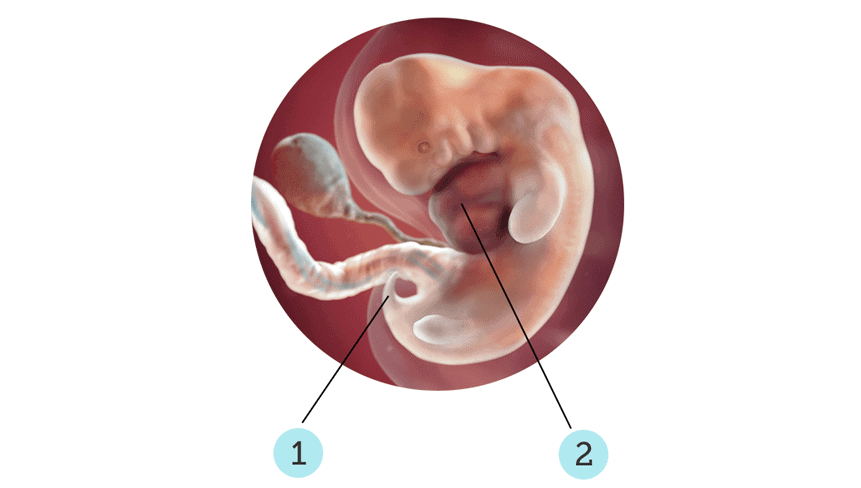Are you seven weeks into the fascinating journey of pregnancy? Congratulations! This thrilling stage is where the magic truly begins, with unbelievable changes and developments happening daily. From heartbeats to tiny limbs, your little bundle of joy is evolving in incredible ways! Here lies an insider’s guide to what’s happening inside you: symptoms you’ll face, development milestones of your fetus, and importantly how to care for your budding baby. It’s a cosmic voyage within your own body, and we’re here to navigate you through it. So buckle up and be enlightened by the marvel called life!
At 7 weeks pregnant, your baby is rapidly growing, generating new brain cells at an impressive rate. This stage of development includes the formation of the umbilical cord and the mucus plug in the cervix, as well as the emergence of web-like hand and feet stubs. You may experience symptoms like morning sickness, tender breasts, food aversions, and abdominal cramps, which are generally normal during the first trimester. Remember to consult with your healthcare provider for personalized advice and support throughout your pregnancy journey.
Table of Contents
Recognizing Pregnancy Symptoms at 7 Weeks
Welcome to the 7th week of your pregnancy, a crucial stage of fetal development. During this period, you may experience various symptoms that indicate your pregnancy’s progress. Some women may start noticing these signs earlier, while others might experience them later. However, it’s perfectly normal to observe them at this point in your pregnancy.
For example, one typical symptom is morning sickness, which isn’t limited to mornings only. You may feel nauseous throughout the day and experience vomiting as well. Additionally, hormonal changes in your body can cause mood swings, irritability, and emotional sensitivity.
Some women report experiencing extreme fatigue during the first trimester due to increased progesterone levels in their bodies. Others may have food cravings and aversions; you may find certain foods unappetizing or seek out foods you wouldn’t typically eat before becoming pregnant.
Your body is also under considerable strain during this period as it adapts to meet the needs of your growing fetus. Here are some common physical changes that you can expect:
- At 7 weeks, your baby is approximately the size of a blueberry, about 10,000 times bigger than it was at conception (American College of Obstetricians and Gynecologists).
- Your baby’s brain cells are growing at an astounding rate of around 100 per minute (University of Oxford, Department of Physiology, Anatomy & Genetics).
- More than 80% of women will experience symptoms like morning sickness and tender breasts during their first trimester, which includes the seventh week (National Institute for Health and Care Excellence).
Physical Changes and What to Expect
During the seventh week of pregnancy, your baby is now about the size of a blueberry and is growing rapidly. You might not notice much difference from week six’s appearance, but significant changes are taking place inside of you.
One prominent feature is breast growth – your breasts will continue to become larger throughout the pregnancy, thanks to increased blood supply and milk ducts preparing for lactation. The areola, the darker skin around the nipple, will become more extensive too.
The umbilical cord connecting your baby’s placenta is forming while webbing-like hand and foot stubs should be visible. Alongside this development are changes happening in your cervix as a mucus plug forms within.
You might notice slight abdominal cramping during pregnancy’s early stages; however, if severe or accompanied by other symptoms, consult a doctor.
More changes might include constipation or frequent urination as your uterus expands and puts pressure on the surrounding organs.
With so many physical changes happening, it’s essential to take care of yourself. Eating fruit can provide essential nutrients while also helping with regularity. Avoid handling cat litter due to the risk of toxoplasmosis infection.
Think of pregnancy like a journey – you need to equip yourself physically and mentally to handily manage the challenges that come with it.
However, while there are expected changes in the body during pregnancy, it is crucial to remember that every pregnancy is unique. It’s important to keep track of your development with regular checkups with your healthcare professional.
Baby Development and Bodily Changes at 7 Weeks
As you enter the seventh week of your pregnancy, your baby has progressed significantly. At this stage, your little one is as small as a blueberry but is developing rapidly, generating new brain cells at a rate of approximately 100 per minute. The size of your uterus will have doubled since conception, and the embryo now resembles a tiny tadpole-like creature. Your baby’s development includes the formation of the umbilical cord, which will serve as their source of nutrients throughout gestation.
Think of it like building a foundation for an impressive structure – strong foundations are vital to ensure the building’s longevity and quality.
- At the seventh week of pregnancy, your baby is growing and developing at a rapid pace. It may be as small as a blueberry, but it is busy generating new brain cells and forming important structures like the umbilical cord. Just like a building needs a strong foundation, this early stage of development is crucial for ensuring the health and wellbeing of your baby throughout gestation.
Key Developmental Milestones
During the seventh week, embryonic growth begins to manifest in noticeable ways. By now, your baby’s webbed feet and hand “paddles” have started to grow fingers and toes that can be seen on an ultrasound scan. Organs such as the liver, pancreas, kidneys, and lungs continue to develop as well.
While your baby is only half an inch long at this point, their neural network is already beginning to form into various regions. Of note is the hindbrain. It unfolds into four distinct bulges that will later form different sections of the adult brain.
It’s important to note that despite all these exciting developments; your body may undergo some significant changes. You may experience symptoms like morning sickness, tender breasts, food aversions or cravings. The size of your breasts may have increased and become tender and sensitive – this is due to hormonal fluctuations necessary for lactation after birth. On top of all this: it’s normal to experience abdominal cramps during the first trimester; self-care must be paramount in maintaining holistic health.
As you continue on this journey, ensure that you communicate with medical professionals if any unprecedented issues crop up so that they can guide you accordingly. Remember: every pregnancy has its journey and unique experiences and thus embracing yours wholeheartedly is vital.
With these key milestones, how best can you support your baby’s growth through bolstering nourishment? Let’s explore nutritional supplements that can help achieve this.
Boosting Nutrition at 7 Weeks Pregnant
At this crucial stage in your pregnancy, it’s vital to boost your nutrition to facilitate fetal growth and development. Eating fresh fruits and vegetables is an excellent way of ensuring a steady stream of essential nutrients. You may experience food aversions, but there are plenty of other options available to cater to your changing preferences. Remember that everything you consume directly affects your growing baby.
For instance, berries contain high levels of vitamin C while spinach offers ample iron intake. These vitamins and minerals aid in the proper formation of red blood cells and support the immune system.
Moreover, incorporating lean protein sources like chicken or turkey breast will provide the necessary amino acids to help grow your baby’s tissues.
Essential Vitamins and Minerals
As your body undergoes significant changes during pregnancy, it’s crucial to supplement with additional vitamins and minerals to support both you and your developing fetus. Some fundamental nutrients required during early pregnancy include:
- Folic Acid: This nutrient is primarily responsible for preventing neural tube defects in babies. Dark leafy greens, nuts, beans are all rich sources of folic acid.
- Calcium: Calcium is essential for bone development and healthy teeth in both you and your baby. Leafy green vegetables, dairy products, and calcium-fortified juices offer sufficient calcium intake.
- Iron: Iron is necessary for the production of hemoglobin – a protein found in red blood cells that carry oxygen throughout the body. Good sources of iron include lean beef, fish, poultry, beans, leafy green vegetables.
It’s not always easy getting all the required amounts from diet alone, so consulting with a healthcare professional about additional supplements may be necessary.
Furthermore, Vitamin D is essential during pregnancy since it helps absorb calcium efficiently. Exposure to sunlight or fortified milk can provide enough Vitamin D. However, natural food sources that provide adequate levels are limited.
Knowing these essential vitamins and minerals is critical, but it is also important to understand how to traverse the 7th week of pregnancy successfully.
At week 7, pregnancy symptoms can be challenging to navigate. With the fatigue and nausea that often comes with the territory, it’s important to prioritize self-care while looking after your growing fetus.
If you’ve been battling intense morning sickness for weeks on end, remind yourself that this is normal. While it may feel like an endless struggle, take comfort in knowing that most women start feeling better by the end of the first trimester. In the meantime, try natural remedies like ginger tea or acupressure bands to alleviate nausea.
Eating a balanced diet is crucial in ensuring optimal fetal development. Incorporating fruits into your meals will provide essential nutrients and help regulate bowel movements. Keep in mind that certain foods should be avoided during pregnancy – for instance, undercooked meat, fish high in mercury content and unpasteurized dairy products. Below are some examples of nutrient-rich foods suitable for pregnancy:
| Food | Benefits |
|---|---|
| Avocado | Contains healthy fats that facilitate fetal brain development |
| Spinach | Packed with vitamins, such as A, C and K |
| Legumes | High in iron and folate |
| Greek yogurt | Rich in calcium and probiotics |
Like a marathon runner, prioritizing hydration throughout your pregnancy is key to maintaining good health. Drinking plenty of water will stave off fatigue and keep your energy levels up.
One area that tends to spark frequent debate amongst expectant mothers is exercise during pregnancy. While it’s essential to prioritize rest when needed; working out regularly has numerous benefits such as reducing back pain and potentially even minimizing labor pains. However, it’s crucial to first consult with your doctor before starting any exercise regimen.
Aside from physical care, mental health should also be prioritized during this sensitive time. Mood swings and heightened emotions are common during pregnancy, and therapy can offer an outlet for women to navigate these challenges. It’s important to remember that seeking help isn’t a sign of weakness, but rather a crucial aspect of maintaining maternal health.
At week 7, pregnancy symptoms can be all-consuming, both physically and emotionally. However, prioritizing balanced nutrition, hydration, exercise (with permission from your doctor), and mental health care can go a long way in ensuring you and your fetus stay healthy throughout this delicate time.

Elizabeth Baker is a mother of three, wife, and the passionate mind behind this pregnancy and baby development resource. She balances her love for understanding every stage of child growth with her duties as a parent. When she’s not sharing her experiences or studying child development, Sarah enjoys family time, reading, and practicing yoga. She believes in the power of shared knowledge to enhance the beautiful journey of parenthood. Read more About me.
